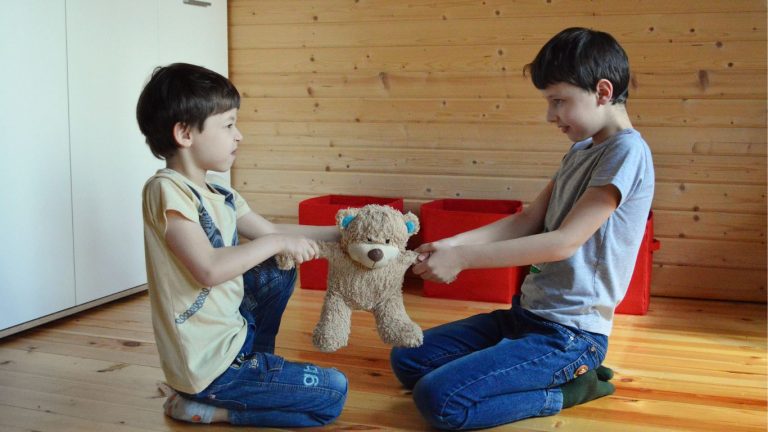We parents can feel consumed by our role to care for our children, and feeding is a big part of that responsibility. Try these 9 ways to avoid picky eater power struggles at your dinner table.
When we feel confident our child is well fed, we can relax. But when we’re not so confident they’re getting all the nutrients they need, it can be very stressful!
Just one more spoonful then you can...
When a parent worries about what, when and how much a child is eating, their fears can lead them to try all sorts of persuasion tactics.
From pleading with them to, ‘try just one, tiny, weeny little bite’; to threats of, ‘if you don’t finish what’s on your plate, there’ll be no dessert.’ Parents can dramatise their praise of a sibling who’s happily polishing off their plate.
Some parents try incentives like a reward for trying a food the child’s adverse to. But trying to change a child’s mind (and will) about their food is unlikely to be successful and can create unnecessary power struggles.
The child will likely feel pressured and coerced and all those feelings can negatively impact their relationship with food. Eating is such an intrinsic part of life, and when conflicts exist around food, that tension can sadly affect the child’s enjoyment of joining the family to eat.
9 ways to avoid picky eater power struggles
1. Bring some humour to the table
Anything you can do to relieve your child’s tension around food, can help them to improve their relationship with food, as well as their appetite!
Children can feel cornered and powerless when encouraged to eat food that doesn’t appeal to them, especially when their refusal elicits their parent’s annoyance. But bringing some humour and goofiness to the table can be hugely relieving and fun!
You could, for instance, try slouching down at the table and dramatically and childishly protest about the ‘yucky’ food on the table.
It shouldn’t take long before your child gets into it and will likely tell you to, ‘eat up and don’t complain’ with a pointing finger and big giggles!
When a parent playfully takes the less powerful role, it can relieve feelings of powerlessness and frustration a child has from being told what to do all of the time.
One mother’s experience
Stacey is a parent who sought my help with the power struggles she was having with her 4 year old daughter, who was a very picky eater. She could relate to how awful her daughter must feel when her mum was upset with her because Stacey remembers the dread she felt when her father got angry at her for not finishing her food when she was a child. Stacey blames those food battles for the ongoing battles she’s had with weight and eating disorders. She felt she’d tried everything to get her daughter to eat.
I suggested she bring some play and humour into the situation, explaining that her daughter’s fear of mum getting annoyed with her was contributing hugely to her daughter’s resistance.
Stacey said her daughter always wanted to take her dolls to the table but she didn’t allow it and asked if this could help. I thought that was a great idea and suggested she used the dolls to do some silly role playing mimicking their mother-daughter squabbles around food.
The next day Stacey rang me excited to report that her daughter loved mum being silly and goofy and laughed so much, continuing to ask for more. Mum played with playfully threatening to steal her girl’s food and her daughter protested, ‘no! It’s mine’ pulling the chopped up meat and veggies back off mum and heartily eating them!
2. Laughter is the best medicine
You can greatly help a child loosen the tight knots of fear and aversion they feel by diluting those uncomfortable feelings with some lighter feelings.
Children instinctively know how to get stressful feelings out of their body and some of the ways they do it is through crying, raging (or passionate venting), trembling (if they’re releasing big fears) and through play and laughter.
When children have felt inhibited from expressing their true feelings, perhaps their complaints around food, or their crying or their play relating to food, they may feel powerless to change those difficult feelings. Allowing big expressions at the dinner table, like laughter, can help relieve tension, reduce stress and pave the way for more enjoyment from eating.
3. Are your expectations realistic?
Sometimes food issues are created through a mismatch between the child’s choices and needs around food and the parent’s expectations.
It’s important that a child develops their autonomy over their own body, including being able to follow their natural instincts around food choices and appetite.
Although most adults eat 3 main meals a day, this isn’t necessarily what works best for a young child. It’s normal for some children to form strong attachments and strong dislikes to certain foods, which they mostly grow out of. Some children benefit from eating a little and often, and are simply not interested in eating a main big meal.
It’s also normal for young children to go through phases when they want and need to eat a lot more than usual. Similar to the growth spurts of a baby.
So set realistic expectations for your kids at the dinner table. If your expectations are out of sync with their needs, you’ll probably create a power struggle that can be difficult to back out of. This article on Healthy dinners has more on this.
4. Trust your child to trust their instincts
Studies have shown, when given the opportunity to self-select their food from a range of healthy options, children tend to make choices that are overall beneficial to their health.
Those studies also show that children will naturally self-regulate when they’ve eaten too much of a certain food or type of food. (Ref: Davis, 1979)
Young children can be trusted to choose a balanced diet as long as a range of healthy food options are available to them throughout the day (Ref: Hirshmann & Zaphiropoulos, 1985).
What this research shows is that children instinctively know what to eat, when to eat and how much to eat. Their bodies guide them naturally in these decisions.
Of course, as parents you want to regulate those decisions somewhat. But aside from preventing children from inducing copious amounts of sugar, your best course of action might be to just follow their lead.
5. Avoid using food as a bargaining chip
Children can develop a distorted relationship with food, if food is regularly used as a conditioning tool. This might look like:
- rewarding them for good behaviour (e.g. ‘you’ll get a cookie when you’ve put all the toys away’)
- distracting them from negative behaviour (e.g. ‘If you kids stop squabbling now, you can have a treat’)
- distracting them from expressing unwelcome feelings (e.g. ‘don’t cry, come and have a glass of juice)
Distracting children from feeling and expressing emotions can start from birth if a parent isn’t tuned in to the difference between a cry that expresses hunger, and one that expresses tiredness, or a tension release (check out Are you listening to your baby? for more on this).
When such habits are formed from birth, children can crave unhealthy foods as a way of feeling better. When this is the case, carrot sticks just won’t hit the mark!
For a child who’s developed a difficult relationship with food, for whatever reason, the sights, textures, smells and tastes of food can cause them to cringe and make them feel very grumpy. Instead of togetherness at meal times, they can feel trapped.
To help a child improve their relationship with food, it really helps to try and imagine their feelings and show them you can see, understand and care for them in those feelings.
To relate to how a child may feel, just try and imagine how it would feel to be coerced into eating something that would be quite disgusting for you. Imagine a food that makes your face wince and your whole body squirm, like eating insects perhaps. Now imagine being told that it’s yummy and good for you!
Making a commitment to avoid words or actions that make your child feel forced, coerced, blamed and rejected relating to their food choices can be a big step in the right direction.
Remembering that you won’t change their mind until you help them change their feelings is a key element in helping a child unwind out of the knots of tension that prevent them from having an enjoyable relationship with food.
6. Reduce conflict by listening and sympathising
So, if your child looks at the food on his plate, and breaks down crying with disappointment and frustration, see it as an opportunity for him to release some of his backlog of pent up frustration around food in general.
If you can prioritise becoming present, listening and showing them you can truly hear, accept and empathise with those big feelings, you’re helping them release some layers of deep seated tension.
The healing a child experiences when they feel truly heard and understood, brings benefits that can’t be gained from them crying without receiving that support. They’ll learn very quickly to try and work with you, rather than against you.
Reducing conflict between parents or other family members at the dinner table will make mealtimes so much more inviting!
7. Allergies and food sensitivities
Other angles to explore can be allergies and intolerances to some of the food in your child’s diet. It could also be the combination of food that could be causing trouble with digestion. This will definitely effect how your child feels about the food.
It’s important to fully explore diet, perhaps talk to your GP about allergy testing or a dietician to help you review your family’s diet in general.
Find out more in our Food allergy symptoms and diagnosis article.
8. Why eat veggies when you can eat chocolate?
Something to consider, the more a child is given the option to eat highly processed food, with refined sugar and salt, the more likely they are to reject healthy food. The more a child eats unhealthy foods, the more they crave them.
The same happens for adults, the more unhealthy food they eat, the less interest they have in fresh foods. In fact, refined salt has an eroding effect on the taste buds of our tongue. This further increases our disinterest in fresh foods.
Instead of processed snacks, put out plates of chopped up fruit, carrot sticks, hummus, nut butters, smoothies and child friendly salads. To make salads more appealing to children, a spoonful of mayonnaise (the healthiest option you can find) mixed through it can make a big difference.
Some children love lots of sweet grated carrot and/or beetroot with raisins in their salad, chopped nuts or toasted seeds. Sautéed onions and chopped bacon bits, cooked in coconut oil, can bring a naturally sweet and salty flavour to salads and veggies.
You should check out Optimum nutrition – how to eat the rainbow for more on this subject.
9. Addressing your own issues with food
Anything you can do to relieve your own tension around your child’s eating is likely to have a positive knock on effect.
At the very least, gaining emotional support and releasing some of your own tension through talking (and even crying) can recharge your batteries. This gives you renewed energy and perspective to once again deal with your child’s own food aversions.
It may or may not be a coincidence that with about 95% of the parents who have sought my help with their child’s eating habits; it’s come to light they’ve had big emotional issues around food, diet and body image themselves.
Many of my clients have had an eating disorder at some point. These parents have learned that addressing those issues is an essential part of feeling less scared, hence less reactive, with their own child.
It’s terribly cliche, but love yourself first right! Read more about Women and diet here.





